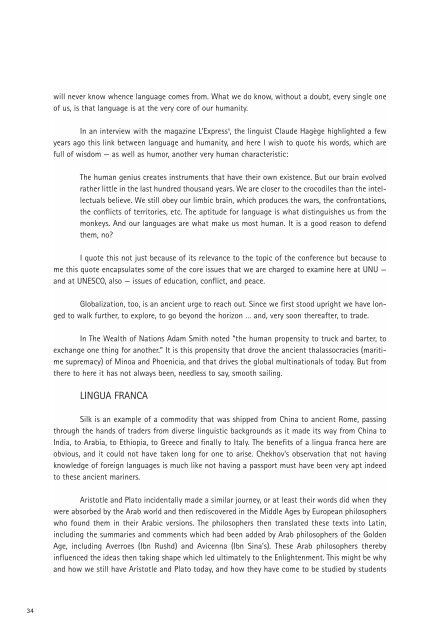Building on our Rich Heritage - unesdoc - Unesco
Building on our Rich Heritage - unesdoc - Unesco
Building on our Rich Heritage - unesdoc - Unesco
You also want an ePaper? Increase the reach of your titles
YUMPU automatically turns print PDFs into web optimized ePapers that Google loves.
34<br />
will never know whence language comes from. What we do know, without a doubt, every single <strong>on</strong>e<br />
of us, is that language is at the very core of <strong>our</strong> humanity.<br />
In an interview with the magazine L’Express 4 , the linguist Claude Hagège highlighted a few<br />
years ago this link between language and humanity, and here I wish to quote his words, which are<br />
full of wisdom — as well as humor, another very human characteristic:<br />
The human genius creates instruments that have their own existence. But <strong>our</strong> brain evolved<br />
rather little in the last hundred thousand years. We are closer to the crocodiles than the intellectuals<br />
believe. We still obey <strong>our</strong> limbic brain, which produces the wars, the c<strong>on</strong>fr<strong>on</strong>tati<strong>on</strong>s,<br />
the c<strong>on</strong>flicts of territories, etc. The aptitude for language is what distinguishes us from the<br />
m<strong>on</strong>keys. And <strong>our</strong> languages are what make us most human. It is a good reas<strong>on</strong> to defend<br />
them, no?<br />
I quote this not just because of its relevance to the topic of the c<strong>on</strong>ference but because to<br />
me this quote encapsulates some of the core issues that we are charged to examine here at UNU —<br />
and at UNESCO, also — issues of educati<strong>on</strong>, c<strong>on</strong>flict, and peace.<br />
Globalizati<strong>on</strong>, too, is an ancient urge to reach out. Since we first stood upright we have l<strong>on</strong>ged<br />
to walk further, to explore, to go bey<strong>on</strong>d the horiz<strong>on</strong> … and, very so<strong>on</strong> thereafter, to trade.<br />
In The Wealth of Nati<strong>on</strong>s Adam Smith noted “the human propensity to truck and barter, to<br />
exchange <strong>on</strong>e thing for another.” It is this propensity that drove the ancient thalassocracies (maritime<br />
supremacy) of Minoa and Phoenicia, and that drives the global multinati<strong>on</strong>als of today. But from<br />
there to here it has not always been, needless to say, smooth sailing.<br />
LINGUA FRANCA<br />
Silk is an example of a commodity that was shipped from China to ancient Rome, passing<br />
through the hands of traders from diverse linguistic backgrounds as it made its way from China to<br />
India, to Arabia, to Ethiopia, to Greece and finally to Italy. The benefits of a lingua franca here are<br />
obvious, and it could not have taken l<strong>on</strong>g for <strong>on</strong>e to arise. Chekhov’s observati<strong>on</strong> that not having<br />
knowledge of foreign languages is much like not having a passport must have been very apt indeed<br />
to these ancient mariners.<br />
Aristotle and Plato incidentally made a similar j<strong>our</strong>ney, or at least their words did when they<br />
were absorbed by the Arab world and then rediscovered in the Middle Ages by European philosophers<br />
who found them in their Arabic versi<strong>on</strong>s. The philosophers then translated these texts into Latin,<br />
including the summaries and comments which had been added by Arab philosophers of the Golden<br />
Age, including Averroes (Ibn Rushd) and Avicenna (Ibn Sina's). These Arab philosophers thereby<br />
influenced the ideas then taking shape which led ultimately to the Enlightenment. This might be why<br />
and how we still have Aristotle and Plato today, and how they have come to be studied by students

















